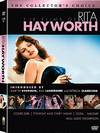





Greer Garson
Biography | Filmography | Awards | Article | Bibliography | Downloads | Links | Image Credits | MRS. MINIVER
| Article: |
Greer Garson Brought Wit, Grace and Charm to Lifeby Charles ChamplinThe Los Angeles Times, April 8, 1996 page F2Greer Garson, who died Saturday at 92, was one of the most beautiful women in Hollywood at a time when Hollywood seemed to house most of the beautiful women in the world. But she was more than one of the pedestal goddesses who could not quite be trusted to speak without a script. She was marvelously, volubly intelligent, and her gift of gab was as central to her attractiveness as her flame-red hair, her eyes and her cheekbones. A journalist friend of mine in Cleveland remembered how Garson had once come to town on a war bond tour and kept a press conference enthralled for an hour while she talked of the comparative success of invasions from the east as compared to invasions from the west. She could commandeer a dinner table with equal ease. While she was getting started as an actress in London, she took a temporary job as a picture researcher for the Encyclopaedia Britannica. One night in Hollywood she was holding forth at a dinner table. Her old British colleague, Reginald Gardiner, listened for a while and then said, "I don't think we should be too awed by Miss Garson; everything she knows begins with the letter B." She told the story on herself, with great amusement. She also liked to tell of the night in her dressing room in London, when she was finally in a successful play. The doorman knocked and said there was a "Mr. Myers" to see her. She knew a hosiery salesman of that name and, tired, told the doorman to have him come back another night. The doorman disappeared and then reappeared, saying the gentleman could only see her that night. He presented the gentleman's card. It was Louis B. Mayer, in person, come to offer her Hollywood and a new life. One year, well after she had retired and gone to live in Dallas with her oilman husband Buddy Fogelson, the local USA Film Festival honored director Mervyn LeRoy. Garson came to the theater at 11 in the morning, dressed to the nines, as for a gala soiree, to watch a screening of "Random Harvest," one of the films, along with "Mrs. Miniver," for which she will be longest remembered. When the lights went up, her makeup was awash with tears. "Darn," she said; "I told myself I absolutely would not cry this time. But I did; the story always makes me cry." She dried her eyes, fixed her makeup as best she could and went on stage to pay an inevitably eloquent tribute to LeRoy. Television, cassettes and laser discs lend film memories a longer life than they ever enjoyed before, when there were only a relative handful of revival houses and university courses to retrieve the medium's classics. But, even now, having retired early to enjoy a happy marriage away from Hollywood, and then living on to a remarkable age, Greer Garson is known to a generation or more largely as a name in the histories of a Hollywood that already seems, a half-century after her great successes, almost as remote as the silents. It is too bad--and the generation's loss--because Greer Garson brought grace, wit, elegance, charm and a lively Irish vigor to a place and an industry. The films she made were of their day--the wartime fervor of "Mrs. Miniver," the powerful sentiment of "Random Harvest" and "Blossoms in the Dust." But there was a lot to be said for the films of that day--and their messages of courage, caring and optimism--and, gifted actress that she was, Greer Garson gave the messages the ring of truth. CAPTION: Greer Garson, shown in 1949, had intelligence and gift of gab. © 1996 Times Mirror Company |
|
Return to the Greer Garson main page. |
| Now in Print! |
|---|
| Now on DVD! |
|---|
Buy Videos & DVDs |
|
Buy Movie Posters |
|
Buy Movie Posters |
|
Classic
Movie Merchandise |
|
![]() Printer-friendly version.
Printer-friendly version.
![]() Return
to the top.
Return
to the top.
Last updated:
March 10, 2011.
Reel Classics is a registered trademark of Reel Classics, L.L.C.
© 1997-2011 Reel Classics, L.L.C. All rights reserved. No
copyright is claimed on non-original or licensed material.
Terms of
Use.









